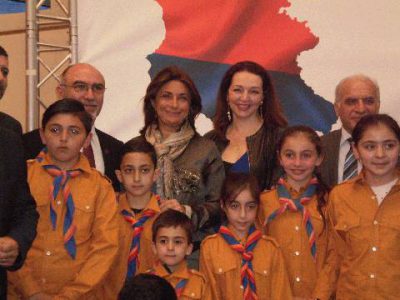
Mouradian my mother voice
By Cameron Vernali,
Kay Mouradian’s mother survived the Armenian genocide at the age of 14.
However, while Mouradian heard stories of her mother’s experiences as a child, the alumna wouldn’t really learn about the details of the horrific event until she began writing a book on the subject called “My Mother’s Voice” in her 50s.
The novel and accompanying documentary focus on her mother’s life during the Armenian genocide, which Mouradian researched for 10 years in libraries, book shops and other countries. Mouradian won the Armenian Genocide Awareness Legacy Award at the Armenian National Committee of America Western Region’s annual awards banquet on Feb. 24 for spreading awareness of the topic and said she hopes a personal focus on the Armenian genocide will help people, especially teachers, remember a part of history that is often forgotten.
Mouradian said the idea for the book first came from her mother, who was suffering from severe dementia. As her condition got worse, she told Mouradian to write a book about her life and the Armenian genocide. However, Mouradian was teaching throughout Los Angeles and had plans to go to Beijing to teach overseas at the time.
But her plans changed – Mouradian never went to Beijing and ended up writing the novel instead. Mouradian said she wanted to help the Armenian genocide retain its place in history, and as a former teacher, she wanted to give other educators a more accessible way of understanding the genocide.
The Armenian genocide began in 1915, during which the Ottoman Empire – which includes modern-day Turkey – committed genocide of more than 1.5 million Armenians residing in the empire. However, Mouradian said people sometimes are unaware of the mass killings since Turkey refuses to acknowledge the genocide, and the word “genocide” did not exist until 30 years after the Armenian genocide.
“I thought to myself, ‘How do I make it easy for teachers to get a grasp of what happened in 1915 to make their job easier and to get their interest involved?’” Mouradian said.
Mouradian researched the genocide using a variety of sources including the history and memoir sections in used bookstores and international trips. At the bookstores, Mouradian would open books to the table of contents and buy them if she saw the word “Constantinople” in it. She also went to UCLA libraries for books on World War I and got in touch with the Library of Congress manuscript division for 10 microreels.
During three trips to Turkey and two to Syria, she searched for her mother’s rescuers, whose descendants remembered her mother decades after the end of the genocide, she said. She also traveled the routes her mother took from her village to Aleppo and through the Syrian desert.
However, Mouradian added to the complexity of “My Mother’s Voice” when she decided to create a documentary with the same name and focus as the novel. Mouradian said she wanted to create the documentary to help students understand the Armenian genocide via a more accessible medium.
Mark Friedman, a sound designer for Moriah Films, helped Mouradian make the documentary after meeting her through mutual friends. The documentary features Mouradian’s voice over archive footage and photographs, as well as live footage of Mouradian herself. Friedman said the focus on Mouradian’s mother’s life created an opportunity for viewers to personally connect with the story.
“When you tell (people) that a million and a half people were murdered (in the Armenian genocide) … that number is so large that they can’t identify with it,” Friedman said. “But when you follow somebody’s life specifically, I think it has a lot of meaning and really affects people in the way we wanted them to be affected.”
Mary Mason, the director of teaching and learning in Glendale, met Mouradian while working with her on the Genocide Education Project training committee for district teachers. Mason said she thinks the documentary is a useful educational tool because it is personal and appropriate for kids to watch and talk about but does not oversimplify the topic.
“It puts a very real face on something that happened 100 years ago, and I think that’s important in the bigger context,” Mason said.
“My Mother’s Voice” is currently pending approval of the curriculum review committee of Glendale, which would result in the distribution of class sets for middle schools. Mouradian said integrating her work into educational systems is the most important aspect of her work because it ensures future generations will learn about events that are currently left out of textbooks.
“The Armenian genocide does deserve its rightful place in history,” Mouradian said.

 The Assembly Transportation Committee last week passed SCR 25 which paves the way for the installation of a sign at the Fair Oaks Avenue exit off Interstate 210 to guide visitors to the Pasadena Armenian Genocide Memorial.
The Assembly Transportation Committee last week passed SCR 25 which paves the way for the installation of a sign at the Fair Oaks Avenue exit off Interstate 210 to guide visitors to the Pasadena Armenian Genocide Memorial.
 From October 15 to 16 held in Varna (Bulgaria) 7th meeting of the “International Association of Bulgarians” in the presence of numerous representatives of Bulgarian associations from Bulgaria and many other countries.
From October 15 to 16 held in Varna (Bulgaria) 7th meeting of the “International Association of Bulgarians” in the presence of numerous representatives of Bulgarian associations from Bulgaria and many other countries. The president of the County Council of Bouches-du-Rhône, Martine Vassal, inaugurated on April 19 evening a banner in memory of the 1915 genocide.
The president of the County Council of Bouches-du-Rhône, Martine Vassal, inaugurated on April 19 evening a banner in memory of the 1915 genocide.



